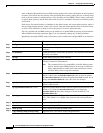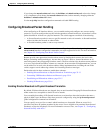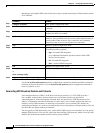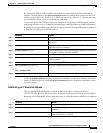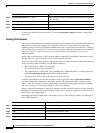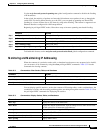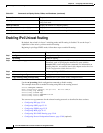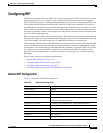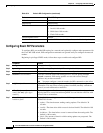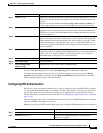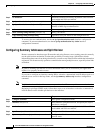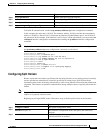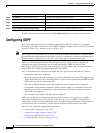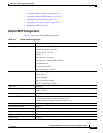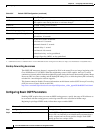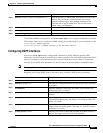
35-20
Cisco ME 3400 Ethernet Access Switch Software Configuration Guide
OL-9639-06
Chapter 35 Configuring IP Unicast Routing
Configuring RIP
Configuring Basic RIP Parameters
To configure RIP, you enable RIP routing for a network and optionally configure other parameters. On
the Cisco ME 3400 switch, RIP configuration commands are ignored until you configure the network
number.
Beginning in privileged EXEC mode, follow these steps to enable and configure RIP:
Offset list Disabled.
Output delay 0 milliseconds.
Timers basic • Update: 30 seconds.
• Invalid: 180 seconds.
• Hold-down: 180 seconds.
• Flush: 240 seconds.
Validate-update-source Enabled.
Version Receives RIP Version 1 and 2 packets; sends Version 1 packets.
Table 35-4 Default RIP Configuration (continued)
Feature Default Setting
Command Purpose
Step 1
configure terminal Enter global configuration mode.
Step 2
ip routing Enable IP routing. (Required only if IP routing is disabled.)
Step 3
router rip Enable a RIP routing process, and enter router configuration mode.
Step 4
network network number Associate a network with a RIP routing process. You can specify multiple
network commands. RIP routing updates are sent and received through
interfaces only on these networks.
Note You must configure a network number for RIP commands to take effect.
Step 5
neighbor ip-address (Optional) Define a neighboring router with which to exchange routing
information. This step allows routing updates from RIP (normally a broadcast
protocol) to reach nonbroadcast networks.
Step 6
offset list [access-list number |
name] {in | out} offset [type
number]
(Optional) Apply an offset list to routing metrics to increase incoming and
outgoing metrics to routes learned through RIP. You can limit the offset list with
an access list or an interface.
Step 7
timers basic update invalid
holddown flush
(Optional) Adjust routing protocol timers. Valid ranges for all timers are 0 to
4294967295 seconds.
• update—The time between sending routing updates. The default is 30
seconds.
• invalid—The timer after which a route is declared invalid. The default is 180
seconds.
• holddown—The time before a route is removed from the routing table. The
default is 180 seconds.
• flush—The amount of time for which routing updates are postponed. The
default is 240 seconds.



